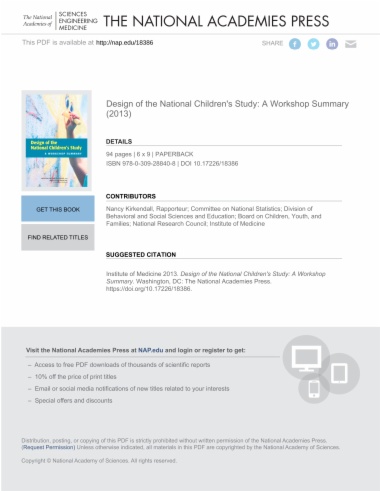

The Children's Health Act mandated the National Children's Study (NCS) in 2000 with one of its purposes being to authorize the National Institute of Child Health and Human Development (NICHD) to study the environmental influences (including physical, chemical, biological, and psychosocial) on children's health and development. The NCS examines all aspects of the environment including air, water, diet, noise, family dynamics, and genetics, on the growth, development, and health of children across the United States, for a period of 21 years. The purpose of NCS is to improve the health and well-being of children and to contribute to understanding the role of these factors on health and disease.
The research plan for the NCS was developed from 2005 to 2007 in collaboration among the Interagency Coordinating Committee, the NCS Advisory Committee, the NCS Program Office, Westat, the Vanguard Center principal investigators, and federal scientists. The current design of the study, however, uses a separate pilot to assess quality of scientific output, logistics, and operations and a "Main Study" to examine exposure-outcome relationships. The NCS proposed the use of a multilayered cohort approach for the Main Study, which was one of the topics for discussion at the workshop that is the subject of this publication.
In the fall of 2012, NICHD requested that the Committee on National Statistics (CNSTAT) of the NRC and the IOM convene a joint workshop, to be led by CNSTAT. The workshop was to focus on issues related to the overall design (including the framework for implementation) of the NCS. The committee was provided a background paper which it used to select the challenges that were discussed at the workshop. Design of the National Children's Study: A Workshop Summary presents an overview of the workshop held on January 11, 2013. The publication includes summaries of the four sessions of the workshop, a list of participants, and the agenda.